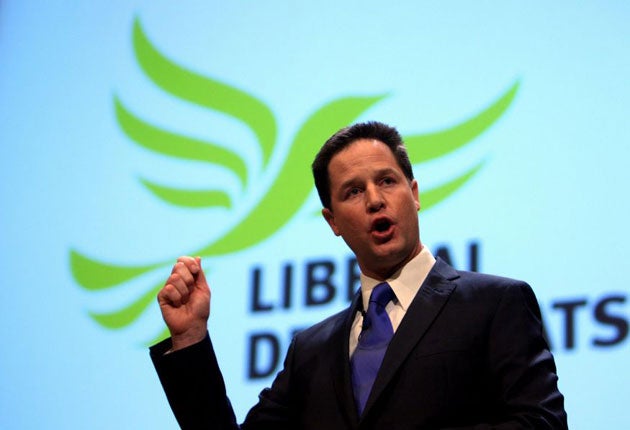Clegg challenges voters to take 'leap of faith' for better Britain
Only Lib Dems can lead nation out of economic ruin, leader tells spring conference

Britain needs to make a radical break from the failed economic policies of the past 30 years and embrace a new political order, Nick Clegg has said, as he attempted to convince voters his was the only party that could guide the country out of economic ruin.
At the close of his party's Spring conference in Harrogate, the Liberal Democrat leader called on voters to take a "leap of faith" that his party's visionary policies were needed to create a better Britain as a result of the recession. But Mr Clegg made his pitch to the nation amid concerns among his top team that the party still lacks a unique selling point with which to attract voters at the next election.
Mr Clegg, who blamed the prime ministers from Margaret Thatcher to Gordon Brown for the crumbling economy, said the two main parties wanted to "cling to those old 80s ideas with a tweak here, or a nip and tuck there". He added the crisis had opened "the door to a genuinely new way of doing things".
Trying to show his party was planning for life after the economic collapse, he compared the Liberal Democrat approach to that of Christopher Wren, who used the Great Fire of London to improve the capital, and to that of the men who built the welfare state after the Second World War.
High-street banks would be forced to give up risky, casino-style lending and their bosses banned from receiving short-term bonuses of any kind under the Liberal Democrats. He added that investment banks would still be allowed to take risks, but he had a clear message for those which hit problems: "We will let you fail. We'll allow you to take those risks as long as you don't get involved in high street services. But if things go wrong, don't come begging," he warned.
He reiterated his calls for failed bankers to be banned from sitting on company boards and for the Government to replace its recent VAT cut with a scheme to create about 94,000 green jobs.
In what aides said was a "sober speech for the sober times", Mr Clegg also told the party he would take full control of failed banks, cut taxes for low and middle-income earners, and improve social housing. He also vowed to tackle companies and tycoons using loopholes to avoid paying tax.
While he described Labour as a "spent match", he criticised the Tories' policy to cut spending in a recession as "economic madness". The public had a choice between "patching up the old order, or policies to build a new one", he told delegates.
But with the next election less than 18 months away, concerns also emerged over the weekend that the party is struggling to find a coherent sales pitch with which to win voters. "We still don't have our own tune," said one member of the front bench. "It needs to be something that offers the public a clear alternative, but the old issues that have benefited us in the past such as Iraq have now slipped down the agenda."
Party insiders are particularly concerned about losing seats to the Conservatives in the South, a fear Mr Clegg has attempted to counter by pledging to cut taxes for nine out of 10 taxpayers. "We are now a tax-cutting party," said one of Mr Clegg's inner circle. "I think we share the mood of the country that tax and spend has gone too far now."
Many Liberal Democrats are hoping they will be able to pick up new seats in Northern towns from Labour, where party organisers believe the Tories are still failing to win popular support.
A tougher look for tough times
When Nick Clegg appeared on stage yesterday, party delegates were taken aback by a change in look for the leader. Mr Clegg took to the platform in Harrogate without the foppish, Cameronesque, side-parting that he has sported for his entire political career. In its place, he was sporting a somewhat macho buzz-cut more akin to the US Army recruit than the Liberal Democrats. Aides denied the new look was an attempt to fend off suggestions that Mr Clegg, 42, is seen as too young in the eyes of some voters and needed to toughen his image. "We didn't take any polling on it; it was just something he did before conference because he had some spare time as a result of his paternity leave," said one aide. "He used the same hairdresser and everything."
Join our commenting forum
Join thought-provoking conversations, follow other Independent readers and see their replies
Comments
Bookmark popover
Removed from bookmarks